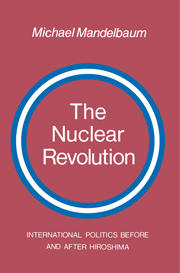Book contents
- Frontmatter
- Contents
- Preface
- 1 The nuclear revolution
- 2 Nuclear weapons and chemical and biological weapons
- 3 The balance of power in the nuclear age
- 4 Arms competition: The nuclear arms race and the Anglo–German naval rivalry
- 5 Arms competition: The nuclear arms race and tariff competitions
- 6 NATO: The nuclear alliance
- 7 The nuclear presidency
- 8 The bomb, dread, and eternity
- Notes
- Index
1 - The nuclear revolution
Published online by Cambridge University Press: 26 January 2010
- Frontmatter
- Contents
- Preface
- 1 The nuclear revolution
- 2 Nuclear weapons and chemical and biological weapons
- 3 The balance of power in the nuclear age
- 4 Arms competition: The nuclear arms race and the Anglo–German naval rivalry
- 5 Arms competition: The nuclear arms race and tariff competitions
- 6 NATO: The nuclear alliance
- 7 The nuclear presidency
- 8 The bomb, dread, and eternity
- Notes
- Index
Summary
Two revolutions
How have nuclear weapons affected international politics? At the dawn of the nuclear age, after the first atomic bomb had shattered the Japanese city of Hiroshima and the second had crushed Nagasaki, the general lines of the answer seemed plain. All had changed, changed utterly. August 1945 seemed one of those rare moments when a new world could be seen being born, when a great transformation seemed to occur palpably and almost instantaneously. The word “revolution” was popular in describing what had happened. The day after the attack on Hiroshima a New York Times editorial warned that “civilization and humanity can now survive only if there is a revolution in mankind's political thinking” Two months later President Truman proclaimed that “in international relations as in domestic affairs the release of atomic energy constitutes a new force too revolutionary to consider in the framework of old ideas.”
Those who pondered the consequences of human control of atomic energy generally expected two revolutions. The first was technical, the result of the enormous destructive power of controlled atomic energy. The second was political. The familiar international institutions and practices, the old ways of doing business among nations, seemed suddenly and completely obsolete. This expectation recalled the principal theme of the most influential of the nineteenth-century writers on revolution, Karl Marx, who envisioned that technological change would produce political upheaval. “At a certain stage of their development,” he had written, “the material forces of production in society come into conflict with the existing rela-tions of production, or – what is but a legal expression for the same thing – with the property relations within which they had been at work before.
- Type
- Chapter
- Information
- The Nuclear RevolutionInternational politics Before and after Hiroshima, pp. 1 - 22Publisher: Cambridge University PressPrint publication year: 1981
- 9
- Cited by



